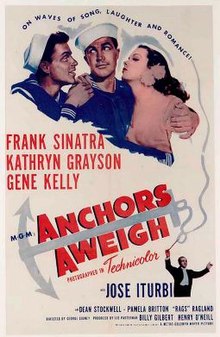This exuberant musical, directed by George Sidney, and starring Frank Sinatra and Gene Kelly, blends live action and animation in an imaginative way, a technique that would become popular decades later with Bob Zemeckis’ “Who Framed Roger Rabbit,” and others.
| Anchors Aweigh | |
|---|---|

Original promotional poster
|
Highlights of the film include Gene Kelly dancing with the animated mouse Jerry (of “Tom & Jerry” fame) and Frank Sinatra crooning, “I Fall in Love Too Easily,” which was nominated for an Oscar.
Though prolific, the Joe Pasternak Unit within MGM was not as prestigious as the Arthur Freed Unit, which worked with the same talent and is responsible for some of Vincente Minnelli’s best musicals, including “Meet Me in St. Louis,” “The Band Wagon,” and “Gigi.”
While Kelly (who also choreographed) and Sinatra shine and enjoy good chemistry, leading lady Kathryn Grayson is weak, but it’s not a major problem, since the musical numbers are good, and so is the secondary cast, which relies on MGM’s vet troupe.
You can detect child actor Dean Stockwell, who will become a major player in the 1950s and 1960s.
Cast
Clarence Doolittle (Frank Sinatra)
Joseph Brady (Gene Kelly)
Susan Abbott (Kathryn Grayson)
Jose Iturbi (himself)
Donald Martin (Dean Stockwell)
Carlos (Carlos Ramirez)
Adm. Hammond (Henry O’Neill)
Commander (Leon Ames)
Police Sergeant (Rags Ragland)
Police Captain (Edgar Kennedy)
Credits
Produced by Joe Pasternak.
Directed by George Sidney.
Screenplay: Isobel Lennart, based on a story by Natalie Marcin.
Art Direction: Cedric Gibbons; Randall Duell.
Choreography: Gene Kelly
Costumes: Irene, Kay Dean
Editing: Adrienne Fazan
Running time: 143 Minutes
Oscar Alert
Oscar Nominations: 5
Picture, produced by Joe Pasternak
Actor: Gene Kelly
Cinematography (color): Robert Planck and Charles Boyle
Scoring of a Musical Picture: Georgie Stoll
Song: “I Fall in Love Too Easily,” music by Jule Styne, lyrics by Sammy Cahn
Oscar Awards: 1
Scoring
Oscar Context
In 1945, “Anchors Aweigh” was the only musical among the Best Picture nominees, which included the sequel “The Bells of St. Mary’s,” Billy Wilder’s problem drama about alcoholism, “The Lost Weekend,” which won, the noir women’s picture, “Mildred Pierce,” with an Oscar-winning turn from Joan Crawford, and Hitchcock’s suspenser “Spellbound.” Note that Ingrid Bergman was in two of the nominees: “Bells of St. Mary’s” and “Spellbound.”
This was Gene Kelly’s only Oscar nomination in a year in which Ray Milland was the winner for “The Lost Weekend”; in 1951, Kelly received an Honorary Oscar as compensation.
The Color Cinematography Oscar went to Leon Shamroy for the noir melodrama, “Leave Her to Heaven,” and the Best Song to Rogers and Hammerstein’s “It Might As Well Be Spring,” for the musical “State Fair.”










